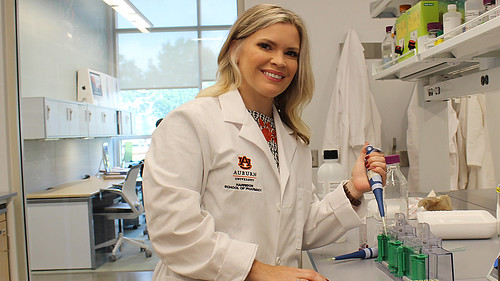Alzheimer’s disease researcher at Auburn University receives gift from Biohaven Pharmaceuticals
Article body
Alzheimer’s disease is the sixth-leading cause of death in the United States and, while there is no cure, early detection and treatment is critical for those afflicted with the disease.
For Dr. Miranda Reed, associate professor in the Harrison School of Pharmacy at Auburn University, her work focuses on the critical time in the early stages of Alzheimer’s as she works to identify those indicators.
Reed’s work has been recognized by Biohaven Pharmaceuticals, a pharmaceutical company based in New Haven, Connecticut, that focuses on development of compounds to treat neurological disorders, with a $60,000 gift to further her research. With this funding, Reed is able to do further research on the early stages of Alzheimer’s, focusing on early detection and treatment.
“It has recently been recognized that there is a ‘silent stage’ of Alzheimer’s disease in which brain alterations are occurring yet there is no or minimal change in memory,” said Reed. “This time period represents an ideal point at which to intervene because in the latter stages of Alzheimer’s disease when memory deficits are readily apparent, there is already irreversible brain damage and neuronal loss. Our hope is that by targeting the earlier stages of the disease, before irreversible brain damage occurs, we can halt disease progression rather than simply masking symptoms.”
Currently, Reed is studying glutamate and its role in Alzheimer’s disease. As Alzheimer’s disease progresses, it erodes synaptic regulation, leading to alterations in learning and memory. Her lab has previously demonstrated a restoration of glutamate signaling with the drug riluzole, a modulator of glutamate activity. Riluzole improved memory performance and pathology in an Alzheimer’s disease model.
“Glutamate is an important neurotransmitter present in over 90 percent of all brain synapses and is critical for learning and memory. However, its levels must be tightly regulated as abnormalities in glutamate function can disrupt nerve health and communication, and in extreme cases may lead to nerve cell death,” said Reed.
“We know that in many neurodegenerative conditions, including Alzheimer’s disease, the processes that regulate glutamate levels are degraded and there is an increase in glutamate activity resulting in cell death. Restoring the mechanisms that maintain glutamate levels represents an early therapeutic target for the treatment and prevention of irreversible brain damage and neuronal loss.”
She is now examining the trigriluzole, a novel drug that offers improved bioavailability, pharmacology, safety and dosing. Reed’s primary objective is to examine the effects of trigriluzole in preclinical models of Alzheimer’s disease.
“Because of the improved bioavailability, pharmacology, safety and dosing of trigriluzole, treatment could be started earlier in the disease with the hope of preventing some of the irreversible brain damage and associated memory loss associate with Alzheimer’s disease,” said Reed.
Charitable gifts made in support of Auburn’s academic programs are received by the Auburn University Foundation on the university’s behalf. To make a tax-deductible, charitable donation to Auburn, or to learn more, visit www.auburngiving.org.
Related Media
Media interested in this story can contact Communications Director Preston Sparks at (334) 844-9999 or preston.sparks@auburn.edu.
Auburn University is a nationally ranked land grant institution recognized for its commitment to world-class scholarship, interdisciplinary research with an elite, top-tier Carnegie R1 classification, life-changing outreach with Carnegie’s Community Engagement designation and an undergraduate education experience second to none. Auburn is home to more than 30,000 students, and its faculty and research partners collaborate to develop and deliver meaningful scholarship, science and technology-based advancements that meet pressing regional, national and global needs. Auburn’s commitment to active student engagement, professional success and public/private partnership drives a growing reputation for outreach and extension that delivers broad economic, health and societal impact.





